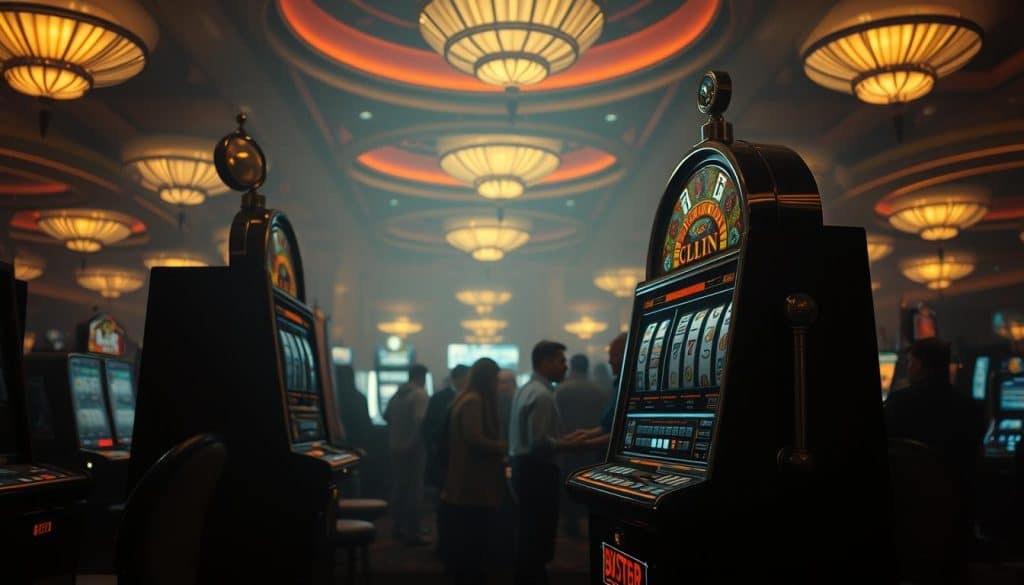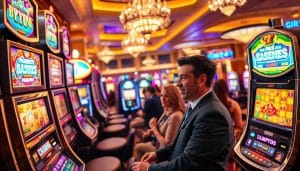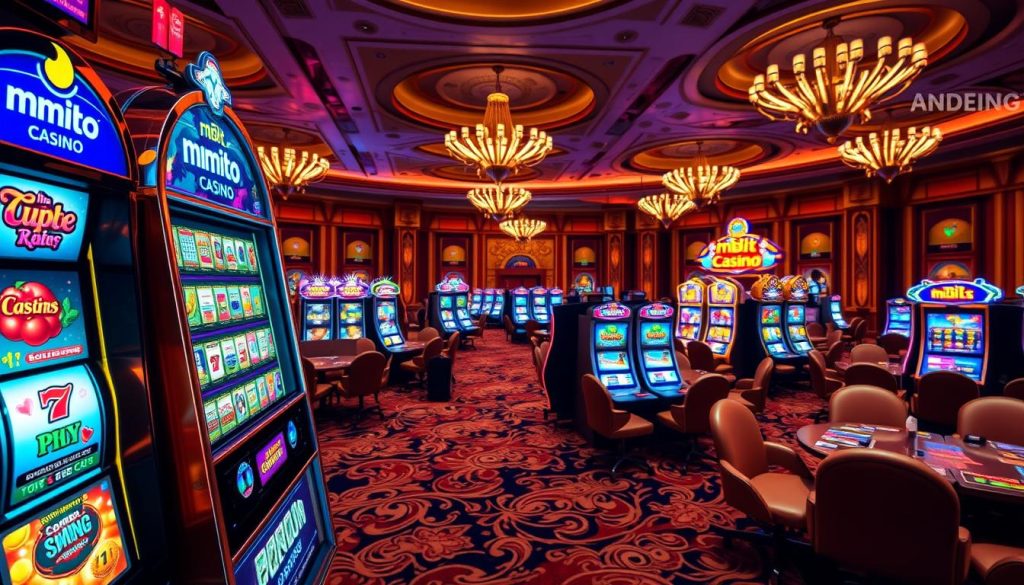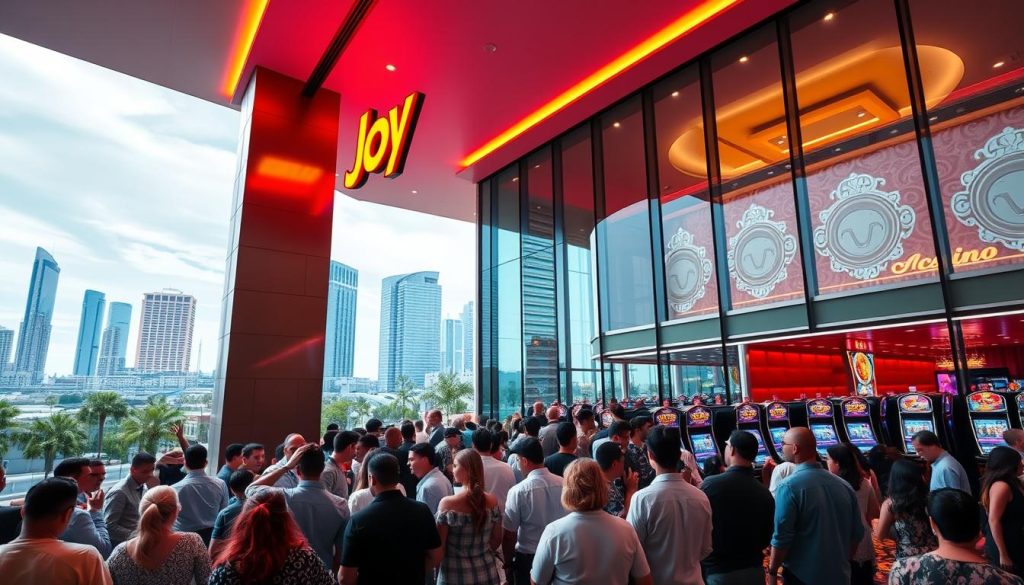Casinos rake in over 70% of their revenue from gaming machines. This isn’t due to bad luck. Most players don’t grasp the math working against them. I’ve spent many hours playing pokies in venues and online.
Players often rely on feelings, not facts. They chase losses and stick with “hot” machines. Many believe their next spin could be the one. I understand this mindset.
This guide won’t teach you to beat pokies. That’s impossible long-term. But it will help you make smarter choices. We’ll explore slot machine odds and winning probability.
We’ll also look at the algorithms behind each spin. This knowledge changes how you approach gaming machines. It applies whether you’re in Auckland or Christchurch.
Key Takeaways
- Casino gaming machines generate the majority of venue revenue because of mathematical advantages built into every game
- Understanding return-to-player percentages helps you choose games with better long-term outcomes
- Random number generators ensure every spin is independent, meaning past results don’t influence future spins
- House edge varies significantly between different machines and venues across New Zealand
- Smart bankroll management matters more than betting strategies or “systems”
- Knowing the odds won’t guarantee wins, but it prevents costly misconceptions and unrealistic expectations
What Are Slot Machine Odds?
Slot machine odds impact your wallet more than you might think. The gambling industry keeps this information hidden. But understanding these basics changes how you approach every spin.
Slot odds differ from traditional gambling probability. You can’t count cards or predict roulette outcomes here. These odds are programmed into software that decides your fate instantly.
The Mathematical Reality Behind the Symbols
Slot odds show the chance of landing specific symbol combinations. Random Number Generators control these odds. We’ll explore this concept more later.
Slot odds involve two key ideas. First, the chance of hitting a winning combo. Second, payout percentages, or Return to Player (RTP).
A 95% RTP doesn’t mean you’ll get $95 back for every $100 wagered. It means the machine returns 95% of all money wagered over time. Your session is pure chance.
“The house doesn’t beat the player. It just gives him the opportunity to beat himself.”
In New Zealand, most pokies have 85% to 95% RTP. The remaining percentage is the house edge. This is the casino’s guaranteed profit on every spin.
Why This Knowledge Protects Your Bankroll
Understanding slot odds turns you from a hopeful gambler into an informed player. Many people in Auckland casinos make mistakes because they don’t grasp these basics.
Knowing payout percentages helps you choose better machines for your bankroll. You’ll see that “hot” and “cold” machines are myths. Each spin is independent, governed by probability.
Here’s what knowing the odds does for you:
- Extends your playing time by helping you choose machines with better RTP
- Sets realistic expectations about winning frequency and amounts
- Protects against common myths that cost players thousands annually
- Helps you budget effectively based on mathematical reality, not hope
Understanding odds doesn’t guarantee wins. Slot machines are entertainment with a built-in house advantage. But knowledge shifts the power dynamic slightly in your favor.
Players who understand these concepts approach slots differently. They play smarter, not harder. They know the math favors the house over time.
Slot odds are the invisible rules of a game most play blindly. Understanding payout percentages won’t make you rich. But it’ll help you lose slower, often the best slot strategy.
How Slot Machines Work
Modern slots are sophisticated computers running complex algorithms. They determine every spin outcome. This knowledge changed how I approach them.
The technology behind these machines is fascinating. I researched for months to understand what happens when I hit that button.
The Technology Behind Random Number Generation
Every modern slot machine has a Random Number Generator (RNG). It’s a microprocessor that works constantly, like your computer.
The RNG generates thousands of number combinations every second. It does this 24/7, even when the machine isn’t being used.
Here’s a surprising fact: you’re not actually starting anything when you press the spin button. You’re just stopping the RNG at a specific moment.
The algorithm doesn’t remember previous spins. It doesn’t know if you just won big or lost many times.
Think of the RNG as a constantly spinning wheel. When you hit spin, you’re taking a snapshot of that wheel.
This means several things that go against popular beliefs:
- Machines don’t run “hot” or “cold” cycles
- A machine that just paid out a jackpot can pay another one immediately
- There’s no pattern you can detect or predict
- The time of day or how long you’ve been playing makes zero difference
How Paylines Determine Your Wins
Paylines are patterns across the reels where matching symbols create winning combinations. Understanding them helps manage your bankroll effectively.
Traditional slots had one payline across the middle. Modern video slots changed this, offering many ways to win.
Here’s an important lesson: more paylines doesn’t automatically mean better odds. It often means higher minimum bets.
Each payline you activate costs money. A 25-payline machine might require betting on all of them.
Some machines offer “ways to win” instead of traditional paylines. These pay when matching symbols appear on adjacent reels.
Understanding Return to Player Percentages
RTP rates show the percentage of wagered money a machine pays back over time. It’s crucial to know this number.
A 95% RTP means for every $100 wagered, the machine returns $95 in winnings. The missing 5% is the house edge.
In New Zealand, pokies typically range from 87% to 97% RTP. That’s a significant difference for your bankroll over time.
You won’t always find this information on the machine. Online slots usually display their RTP rates more clearly.
Here’s what RTP rates mean in practice:
- Short-term play: RTP is nearly meaningless for individual sessions
- Long-term play: RTP becomes more accurate over thousands of spins
- Variance matters: Two machines with identical RTP can feel completely different
The house edge works on every spin. You can’t outsmart it with betting strategies.
I now look for machines with higher RTP rates. Online casinos make this easier by listing RTP percentages.
Understanding RNGs, paylines, and RTP rates changes how you approach slots. You realize it’s just math working against you.
The Mathematics Behind Slot Machines
Slot machine math isn’t complex, but casinos don’t want you to understand it. The numbers tell a clear story when you break them down. I’ve studied these systems for years.
The math always favors the casino. But knowing how it works gives you an edge as a player. Slot math is transparent, with predetermined odds you can grasp.
Most players approach machines without knowing the math behind those spinning reels. Understanding this can change your perspective on slot gameplay.
Probability and Slot Machines
Slot probability uses a simple formula: winning combinations divided by total possible combinations. Let’s look at an example to make this clear.
Imagine a classic three-reel slot with 10 symbols per reel. The total possible combinations are 1,000. If one combo triggers the jackpot, your chances are 1 in 1,000.
Modern video slots are more complex. They can have five reels with 20+ symbols each. Virtual reel tech creates millions of possible combinations.
A machine might show 20 physical symbols but use 200 potential stops per reel. This creates 3.2 billion possible combinations on a five-reel machine.
Finding the exact winning probability becomes nearly impossible. The RNG cycles through these combos thousands of times per second. This makes predictions futile.
I’ve tested machines in New Zealand casinos. The complexity varies greatly. Older machines use simpler math you can roughly calculate. Newer video slots are too complex to analyze.
House Edge Explained
The house edge is the casino’s mathematical advantage over players. It’s calculated from the machine’s Return to Player (RTP) percentage. A 95% RTP means a 5% house edge.
This means the casino expects to keep $5 from every $100 wagered. That’s not a maybe. It’s a mathematical certainty.
Casino advantage doesn’t apply to individual sessions. You won’t lose exactly 5% every time you play. Short-term variance can lead to wins or losses.
The house edge reveals itself over thousands of spins. It’s like flipping a coin. Ten flips might be uneven. But 10,000 flips will be close to 50/50.
New Zealand gaming venues typically have house edges of 2% to 15%. Most modern slots are between 4% and 8%. Online slots often have lower edges, sometimes as low as 2%.
Even a 2% house edge guarantees casino profits. Your job is to manage your bankroll within this reality.
Variance and Volatility in Slots
Slot volatility matters more for gameplay than RTP differences. It describes a machine’s risk level and payout pattern. It answers: How does this slot distribute its payouts?
Low volatility slots pay smaller amounts often. High volatility slots pay rarely but in larger amounts. Your bankroll stays stable with low volatility games.
A 96% RTP high volatility slot can drain money faster than a 94% low volatility one. You might hit 50 dead spins before a big win on high volatility games.
I’ve tracked sessions across volatility levels. Low volatility machines decrease my bankroll slowly. High volatility slots cause massive swings in my balance.
The table below shows how volatility affects your gaming experience:
| Volatility Level | Payout Frequency | Average Win Size | Bankroll Risk | Best For |
|---|---|---|---|---|
| Low Volatility | Very frequent (60-70% of spins) | Small (0.5x to 2x bet) | Minimal fluctuation | Extended play sessions, beginners |
| Medium Volatility | Moderate (30-40% of spins) | Medium (2x to 10x bet) | Balanced swings | Balanced entertainment and winning potential |
| High Volatility | Rare (10-20% of spins) | Large (10x to 100x+ bet) | Extreme fluctuation | Jackpot hunters, risk-takers |
| Very High Volatility | Very rare (5-10% of spins) | Massive (100x to 5000x+ bet) | Maximum risk | Bonus hunters, high-stakes players |
Variance is the mathematical term for volatility. It measures deviation from expected results. High variance means results spread widely. Low variance means results cluster tightly.
In slot terms, volatility and variance mean the same thing. Game developers use “volatility” while mathematicians prefer “variance”. Both describe identical concepts.
Match volatility to your goals for best results. High volatility slots suit jackpot chasers. Low volatility machines are better for extended play on a budget.
Slots generate about 70% of casino revenue in many places. This isn’t luck—it’s math working as designed. House edge, probability, and volatility create a profitable product for casinos.
Types of Slot Machines
Casinos offer various slot machine types. Each has its own math model, payout structure, and risk profile. Choosing the right type is as important as understanding the odds.
Slot machines come in different formats. They appeal to various player preferences. These formats have different house edges and volatility levels.
Classic Slots vs. Video Slots
Classic slots have a three-reel setup with simple symbols. They feature fruits, bars, sevens, and bells. These machines typically have fewer paylines, making gameplay easier to follow.
Loose slots often refer to classic machines. However, this term can be misleading. Classic slots have lower volatility, offering smaller wins more consistently.
I prefer classic slots for casual play. My bankroll lasts longer with them. The entertainment value stretches further. I’m not chasing huge wins that rarely happen.
Video slots are the modern evolution with five or more reels. They feature elaborate digital graphics and bonus rounds. These machines offer free spins, multipliers, and sometimes hundreds of paylines.
Video slots typically have higher volatility than classic ones. You might experience long dry spells before hitting a decent bonus round. Maximum wins can be substantial, but overall win frequency decreases.
Progressive Jackpots Explained
Progressive jackpot machines are networked together. A portion of every bet feeds into a growing prize pool. The displayed jackpot climbs with every spin on the network.
Progressive jackpot chances are extremely low. Odds are similar to winning a lottery, sometimes worse than one in several million. Casual players shouldn’t expect to hit the jackpot.
Progressives usually offer lower base-game RTP. Money is diverted from regular payouts to fund the massive top prize. Base-game RTP rates on progressives are often lower than on standard machines.
Progressive systems come in different configurations. Local progressives link machines within a single casino. Wide-area progressives connect casinos across entire regions or countries. Someone eventually wins these prizes.
The Rise of Online Slots
Online slots have become incredibly popular. They operate on the same RNG principles as physical machines. Online casinos typically offer better RTP rates due to lower overhead costs.
Online slots often have RTP ranging from 94-98%. Most reputable online casinos display the RTP for each game. This transparency helps players make informed choices.
In New Zealand, online gambling laws are complex. Operating an online casino within New Zealand is restricted. Many Kiwis access offshore platforms that accept players from our region.
Online slots offer more variety than physical casinos. You’ll find thousands of titles from many software providers. This competition benefits players by offering games with favorable odds.
Online slots allow play in demo mode before risking real money. You can test volatility and understand bonus features without spending. This option isn’t available with physical machines.
Analyzing Slot Machine Odds
Slot machine probability data reveals surprising insights. Understanding the statistics behind these machines can transform your playing approach. Let’s explore the real numbers you need to know.
Slot machine odds unveil patterns that most players overlook. This is where theory meets actual data, offering valuable insights.
The Numbers Behind Slot Machines
Slot machines operate using a par sheet. This internal document specifies reel stop weightings and the complete payout schedule. Casinos guard these sheets carefully.
Research into leaked par sheets shows interesting statistics. About 30-40% of spins result in some payout. However, most are “losses disguised as wins.”
For example, you bet $2 and “win” $1. The machine celebrates, but you’ve lost $1. Your brain registers it as a victory.
Slot machine odds vary by machine type. However, common patterns emerge across the industry. Here’s a breakdown of payout ranges and their frequencies:
| Payout Range | Frequency | Impact on Player | House Strategy |
|---|---|---|---|
| Small wins (below bet) | 25-35% of spins | Maintains engagement | Reduces perceived losses |
| Break-even wins | 5-8% of spins | Creates hope | Extends play time |
| Medium wins (2-20x bet) | 2-5% of spins | Generates excitement | Justifies continued play |
| Large wins (20-100x bet) | 0.1-0.5% of spins | Creates memorable moments | Word-of-mouth marketing |
| Jackpots (100x+ bet) | 0.001-0.01% of spins | Drives aspirational play | Attracts new players |
These payout percentages explain why slots feel winnable. Frequent small payouts create “intermittent reinforcement.” This is the most addictive reward schedule in behavioral science.
The slot machine is engineered to give the player the sense that winning is always just around the corner, even as the overall odds ensure the house always wins.
Visualizing Probability and Payouts
Graphing slot machine odds against payouts reveals a telling distribution. It resembles an exponential decay curve, dropping sharply from left to right.
Small payouts have high probability on the left. As you move right, larger payout probability drops dramatically. This design balances player engagement with house profitability.
The curve looks like this in practical terms:
- Small wins occur frequently enough to feel achievable
- Medium wins happen just rarely enough to feel special
- Large wins are distant enough to maintain mystique
- Jackpots exist in the realm of fantasy for most sessions
Different payout percentages shift this curve. A 95% RTP machine differs from an 85% RTP machine. It changes where the probability mass concentrates.
What Actually Affects Your Chances
Several key factors determine slot machine odds. Understanding these helps you make smarter choices. Here are patterns observed across New Zealand venues:
Number of reels and symbols: More reels mean lower odds of hitting specific combinations. A three-reel machine has 8,000 possible combinations.
RTP percentage settings: Manufacturers program machines with variable payout percentages. New Zealand casino pokies typically run between 87-92% RTP. Pub and club machines often sit at 85-88%.
Volatility profiles: Two machines can have identical RTP but different playing experiences. High volatility means fewer wins but bigger payouts. Low volatility means frequent small wins.
Bonus features: Free spins, multipliers, and bonus rounds complicate probability calculations. These features often contribute 30-50% of a machine’s total return. They trigger infrequently in most sessions.
Venue differences: Casino machines generally offer better odds than pub pokies. Casinos rely on volume and extended play sessions. Smaller venues need higher margins per machine.
Denomination matters: Higher denomination machines usually have better payout percentages. Dollar slots might run at 92-94% while penny slots sit at 85-88%. However, your risk per spin increases.
Understanding these factors won’t help you beat the system. It’s mathematically impossible over time. But it helps you choose machines that fit your style and budget.
Tools for Evaluating Slot Machine Odds
I’ve tested resources that help players understand slot machine odds before gambling. You can’t calculate exact odds without a par sheet. However, tools exist to help you make more informed choices.
These resources won’t predict payouts or guarantee wins. They show the math behind your gambling session. I use them before visiting casinos, not during play.
Slot Machine Calculators
Online calculators estimate outcomes based on input parameters. You enter RTP rates, bet amount, and session length. The calculator then shows your projected losses.
I use these to set realistic expectations. For example, betting $5 per spin at 94% RTP for 100 spins means $30 in losses.
Results vary due to volatility. But over time, these calculations are accurate. They’ve saved me from unaffordable sessions and helped me budget.
Calculators show the house edge directly. A 94% RTP means a 6% house edge. Advanced calculators compare bet configurations, revealing how bet size affects hourly loss rate.
Online Odds Trackers
These platforms are common for online slots. Players report data about hit frequency, bonus rates, and payout patterns. The information can reveal trends about specific games.
These trackers aren’t scientifically rigorous. They rely on user-reported data, introducing potential bias. But they’re useful for identifying stingy games that underperform.
The main value comes from volume. When hundreds report similar experiences, patterns emerge. I’ve used this to avoid games with low bonus frequencies.
Review Platforms for Slot Machines
Professional review sites test slots, publishing verified RTP rates and volatility classifications. These have become my most valuable resource. I search for reviews before playing any machine.
Quality sites explain what numbers mean in practice. A 96% RTP high-volatility slot plays differently from a low-volatility one. The former has infrequent big wins; the latter provides steady small payouts.
Some reviewers calculate the house edge for different bet configurations. This matters because betting patterns can affect your expected return.
Finding local resources in New Zealand is challenging. Our regulations don’t require the same transparency as other jurisdictions. International sites still cover many machines in Kiwi casinos.
Use these tools before you play, not during. Set your strategy based on solid information. Stick to it regardless of short-term results.
The Impact of Location on Slot Machine Odds
Where you play can change your odds as much as which machine you pick. The physical venue creates real differences in your expected returns. Understanding these location-based variations gives you an edge in managing the casino advantage.
New Zealand’s gambling landscape operates under a unique regulatory framework. Kiwi players face meaningful differences depending on where they decide to spin. This creates interesting variations across different venues.
Casino Regulations in New Zealand
Two primary pieces of legislation govern gaming machines in New Zealand. These are the Gambling Act 2003 and the Casino Control Act 1990. These laws set minimum RTP requirements for gaming machines.
SKYCITY casinos must maintain certain payout standards as part of their licensing agreements. Class 4 gaming machines, found in pubs and clubs, operate differently. The Department of Internal Affairs regulates these machines.
Casinos face more stringent oversight than community venues. This regulatory difference directly affects the casino advantage at different locations.
Comparing Odds Across Venues
Different venue types structure their payout rates in consistent patterns. The business model influences the gambling probability you’re working with. Casino slots typically offer RTP rates between 90-97%.
Community venue pokies paint a different picture. Pubs and clubs commonly set their machines in the 87-94% RTP range. A local pub relies more heavily on pokie income as a primary revenue stream.
| Venue Type | Typical RTP Range | Regulatory Oversight | Revenue Diversification |
|---|---|---|---|
| Major Casinos | 90-97% | Strict (Casino Control Act) | High (multiple revenue streams) |
| Community Pubs | 87-94% | Moderate (Gambling Act) | Low (pokie-dependent) |
| Licensed Clubs | 88-93% | Moderate (Gambling Act) | Medium (membership + pokies) |
| Tourist Venues | 85-92% | Variable by location | Medium (transient customers) |
Not all casinos offer identical odds, and community venues can differ significantly. Establishments with transparent payout information tend to offer better rates. They’re confident enough to publish their RTP percentages publicly.
How Location Affects Payouts
Geographic factors influence payout rates beyond simple regulation. The demographics and foot traffic patterns shape how venue operators configure their machines. Tourist-heavy areas often run tighter machines because repeat business isn’t their primary concern.
Local pubs in residential neighborhoods face different market dynamics. They compete for regular patronage from the same pool of players. Slightly better odds become a competitive advantage that encourages locals to choose one venue over another.
Machine placement within a venue reveals strategic thinking about gambling probability and psychology. Operators program machines near entrances with looser settings. These “showcase” machines create visible winners who attract other players deeper into the venue.
The machines in corners or back rooms often carry tighter odds. Players have already committed to being there. In New Zealand, you’ll find the most transparent odds at major licensed casinos like SKYCITY properties.
Community venues can be more variable in their payout rates. Venue selection is particularly important if you’re playing pokies outside of traditional casinos. Venues that display their gaming machine returns publicly tend to offer better odds.
Predictions for Slot Machine Odds in 2024
Slot machines are evolving rapidly. In 2024, we’ll see big changes in odds, gameplay, and payout calculations. Casinos may become more open about odds, while new rules could better protect players.
The industry faces a turning point. Tech is outpacing regulations. Players want more insight into their chances of winning.
Trends in Slot Machine Development
Variable volatility settings are gaining popularity. New machines let you pick your risk level before playing. You can go for big wins or steady small payouts.
The overall Return to Player (RTP) stays the same. A 92% RTP machine offers this rate for both high and low volatility. The difference is in how winnings are spread out over time.
Skill-based elements are becoming more common in slots. These create an illusion of control through mini-games. The house edge remains, but players feel more involved.
More machines now show RTP on screen. This helps players make smarter choices about which games to play.
Impact of Technology on Odds
Advanced Random Number Generators (RNGs) make outcomes truly unpredictable. Blockchain technology allows for provably fair gambling. Players can verify that results weren’t manipulated.
Online slots use artificial intelligence to personalize gameplay. This can make games more engaging, but also more addictive.
Cross-platform progressive jackpots link physical and online slots. This creates massive prize pools and slightly improves progressive jackpot chances.
However, these huge jackpots can trigger problem gambling. The trade-off is between better odds and potential harm.
Potential Changes in Regulations
New Zealand is considering changes to pokie regulations. We might see mandatory loss limits or time restrictions on machines.
RTP disclosure rules may become stricter. Casinos might have to show this info clearly before play begins.
Session-based gambling with built-in breaks could become standard. This would interrupt long playing sessions to prevent trance-like states.
Some regulators want to reduce RTP variance. This would remove the worst-paying machines but might also lower payouts on better ones.
New machines may need built-in responsible gambling features. These could include spending trackers and self-exclusion options.
2024’s rules will likely favor players more. But changes happen slowly due to casino industry influence.
FAQs on Slot Machine Odds
Let’s explore common questions about slot machine odds. These insights come from real conversations and years of gameplay experience. They’ll help you set realistic expectations when playing slots.
Money’s at stake, so no question is too basic. Let’s dive into the facts without any fluff.
What Are Typical Odds for Slot Machines?
Slot odds vary widely based on what you’re aiming for. Standard video slots offer a payout on roughly 1 in 3 spins. However, most of these payouts are smaller than your original bet.
Jackpot odds differ greatly between machine types. Non-progressive machines have jackpot odds from 1 in 50,000 to several million spins. Progressive jackpots have lottery-level odds, often millions to one.
“Loose slots” usually mean machines with slightly better hit frequency. New Zealand casinos offer RTP percentages between 87% and 96%. Online slots can reach up to 98% RTP.
| Slot Type | Jackpot Odds | Hit Frequency | Typical RTP |
|---|---|---|---|
| Classic 3-Reel | 1 in 50,000 | 15-20% | 88-92% |
| Video Slots | 1 in 500,000 | 25-35% | 94-96% |
| Progressive Jackpot | 1 in 5,000,000+ | 20-30% | 90-93% |
| Online Slots | 1 in 250,000 | 30-40% | 95-98% |
Each spin is independent. The machine doesn’t remember past spins or “owe” you anything. This is a tough truth for many players to accept.
Can You Beat Slot Machine Odds?
No, you can’t beat slot machine odds long-term. Slots are designed with a built-in house edge. The math ensures the casino always wins over time.
You might have lucky sessions where you double your money. But that’s just short-term variance, not skill. Beware of anyone selling a “system” to beat slots.
The Random Number Generator doesn’t care about betting patterns or timing. These are gambling myths that can cost you money.
How to Choose the Best Slot Machines?
Focus on maximizing fun and minimizing losses. Check for high RTP rates, ideally above 96%. Consider volatility based on your bankroll and style.
- Low volatility: Choose these for longer playing sessions with frequent small wins
- High volatility: Pick these if you’re chasing bigger payouts and can handle rapid losses
- Medium volatility: Offers balance between hit frequency and payout size
Avoid progressives unless you’re after a life-changing win. They have worse base game odds. Higher denomination machines usually offer better RTP percentages.
The concept of “loose slots” is mostly myth. What seems “loose” might just be normal statistical variation. Choose machines you enjoy for the best experience.
Evidence and Sources on Slot Machine Odds
Finding trustworthy slot machine odds info requires careful research. I’ve learned to spot real data amid marketing hype. Years of cross-referencing sources have honed my skills.
Academic Research and Industry Studies
Gambling mathematics research studies provide the basis for understanding probability curves. The Journal of Gambling Studies offers peer-reviewed analyses of RNG distributions and machine performance.
Researchers like Robert Williams have studied pokies behavior in our region. These studies show important differences between theoretical RTP and actual results.
Regulatory Bodies and Testing Labs
The New Zealand Department of Internal Affairs publishes gaming machine stats and compliance reports. Independent labs like eCOGRA and GLI certify machine randomness and verify payout percentages.
Game makers like IGT and Aristocrat sometimes share RTP data in technical docs. Online platforms like ThePogg.com and AskGamblers.com have databases of verified returns.
Practical Analysis Resources
Data analysis tools range from simple spreadsheets to complex statistical software. Monte Carlo simulations can model millions of spins to check theoretical odds against real outcomes.
Free online RTP calculators and bankroll management tools are good starting points. They turn complex math into useful info. Always check methods and funding sources before trusting slot machine odds claims.










